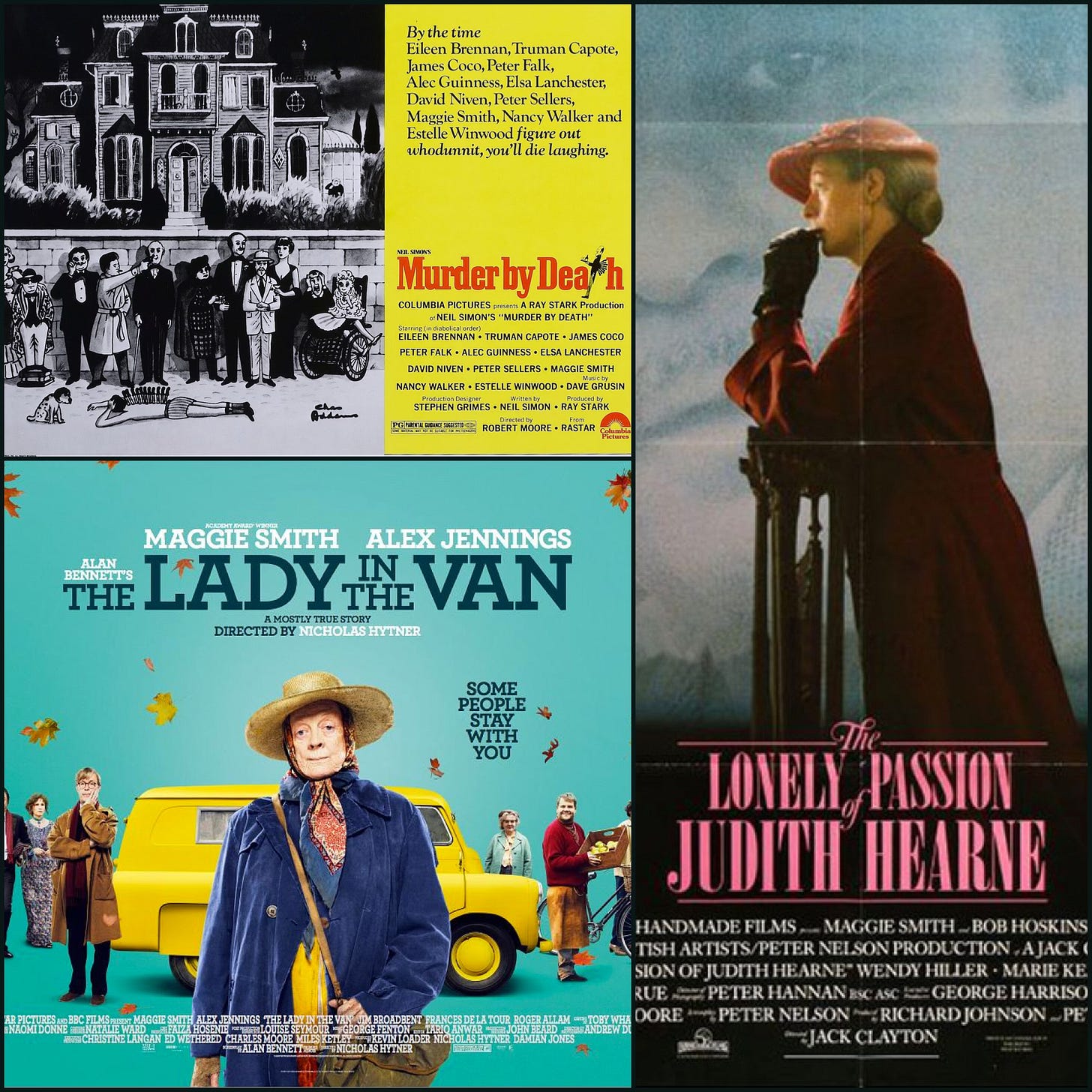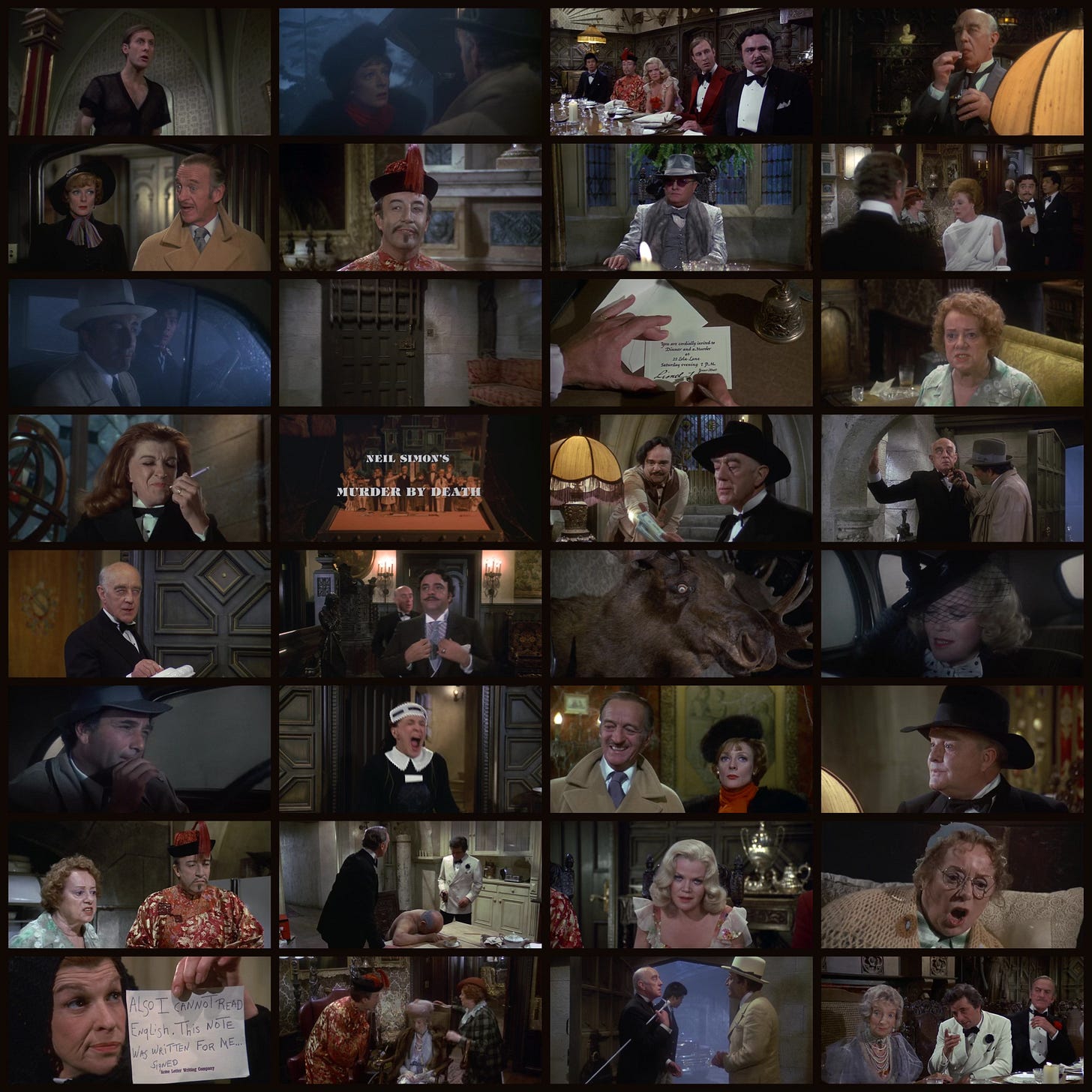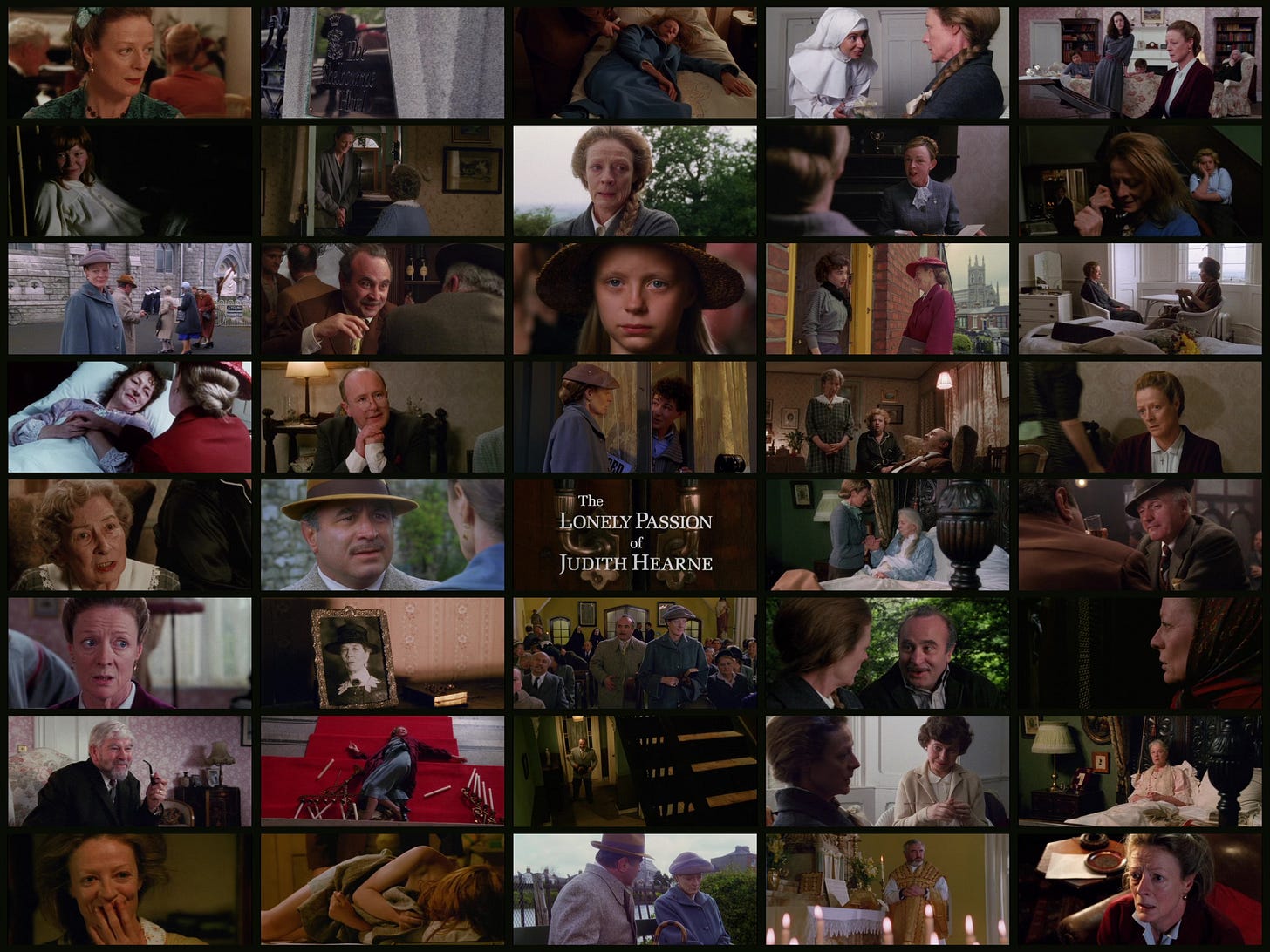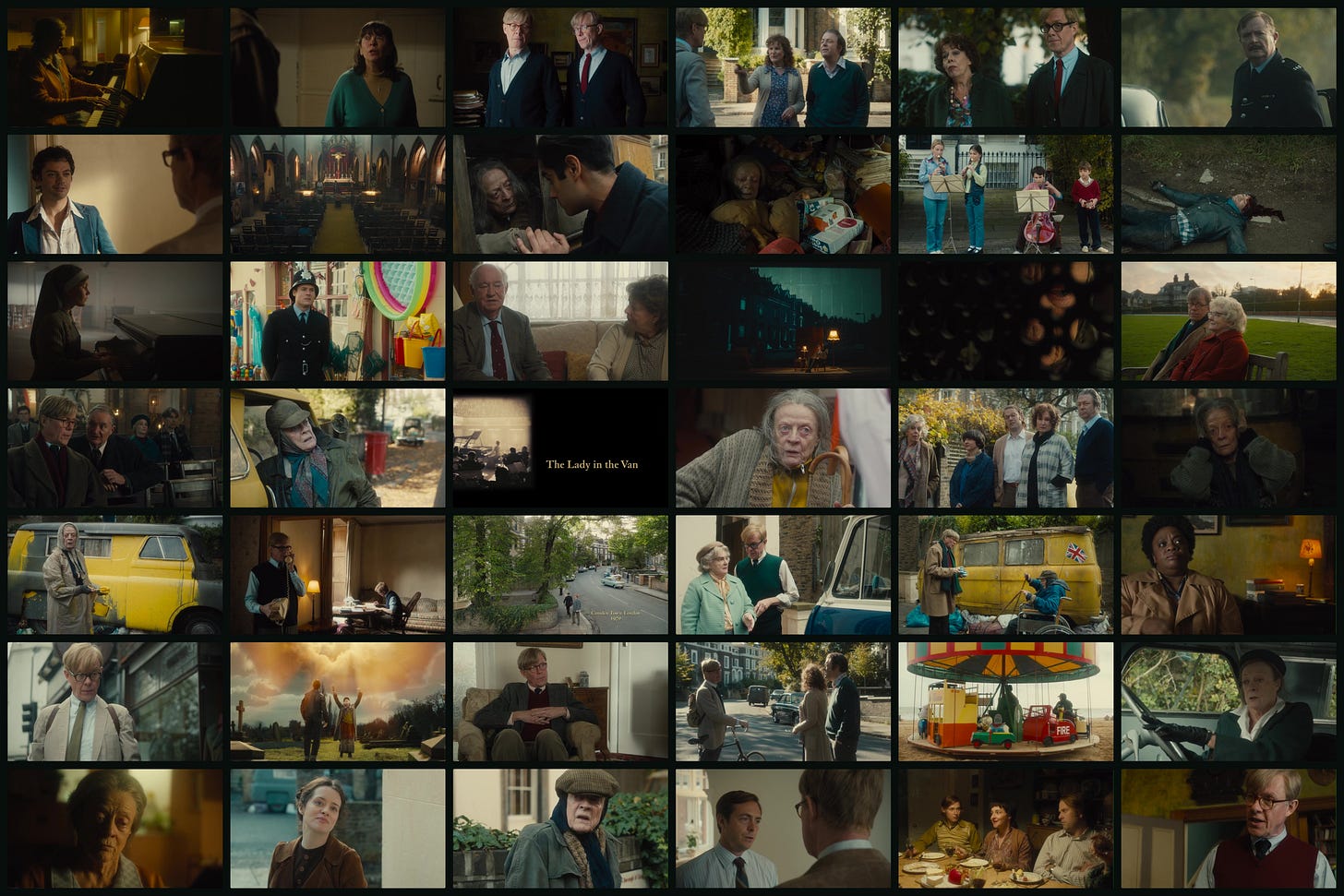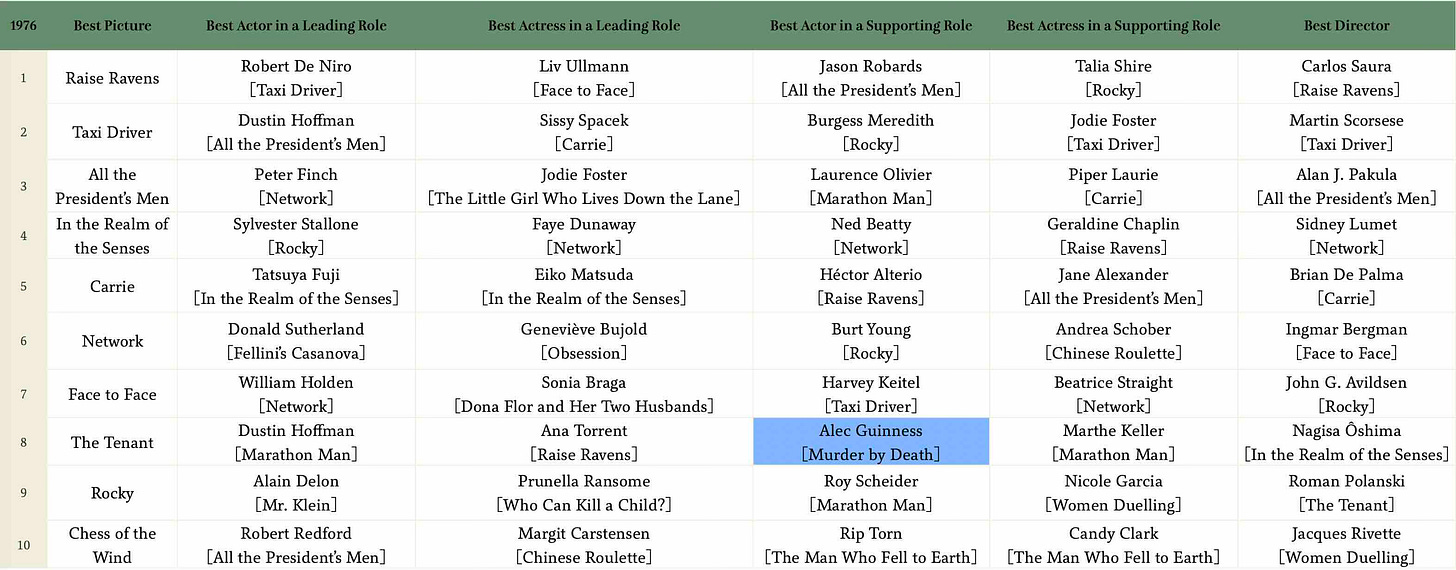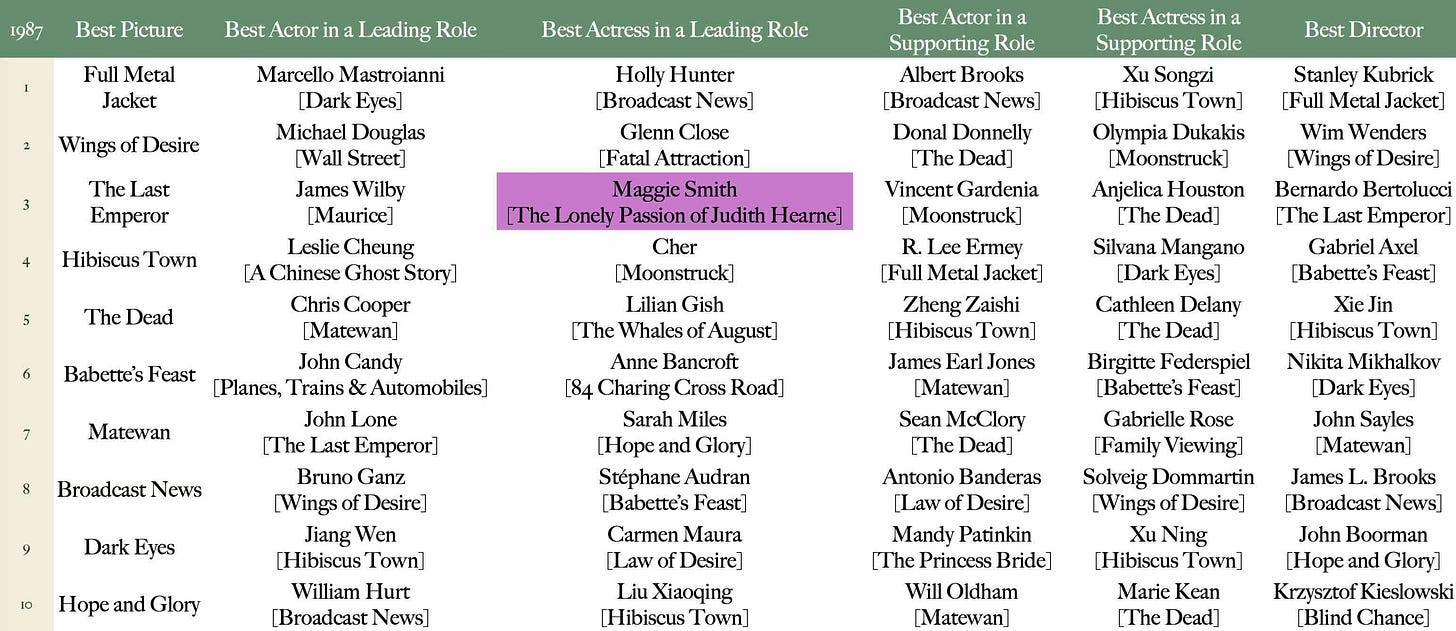[Film Review] Murder by Death (1976), The Lonely Passion of Judith Hearne (1987), The Lady in the Van (2015)
Oh, this one really hurts. We all know this day will come, but how can we bid adieu to Dame Maggie Smith (1935-2024) without being inundated by an oceanic ebullition of incredulity, loss and grief? We could only commemorate her by watching her works. Here is a mini-marathon of 3 films chosen from her illustrious career spanning nearly seven decades, starting from a posho lady playing an undeterred foil to his equally posho detective husband in a shamus pastiche, to a fancy-free spinster, whose apparent romantic late blooming only drags her down to alcoholism and utter misery, then culminating as a slovenly homeless old crone, bedeviled by guilt, obstinately lives her remaining days on her own terms and en passant, she becomes an inspo for a writer who is fascinated by her heterodox way of living.
Robert Moore's MURDER BY DEATH flagrantly pokes fun at the murder mystery genre and its sundry authors, corralling five world-famous detectives (a caricature of Hercule Poirot, Miss Marple, Charlie Chan, Nick Charles, and Sam Spade), and their plus ones, to a country manor where its reclusive owner Lionel Twain (Capote, in a sally into playacting) pontifically announces that there will be a murder before midnight, and taunts that none of them could solve it. Then since there are only three persons (Lionel, a blind butler and a deaf-mute and illiterate maid) are present other than the ten guests, the plot archly plays permutations to assign who is the victim and who is the murderer, while sending up the time-honored tropes and proffering flat-out implausibility to keep the detectives engaged in their heated yet utterly fanciful deductions.
While some gags are zany (Guinness's unflappable tricks as the blind butler Jamessir Bensonmum are sublime and Coco's Poirot travesty has its own delightfully flaming moments), the rest of them are either facetious (Sellers's Sidney Wang rather gets one's back up for its conformable racist infelicities, after 40 years, you would think some revisionary measures could've been implemented to the denigrating Charlie Chan stereotype), run-of-the-middle (Niven's William Powell imitation and Lanchester's Miss Marple variety are relatively unexceptional, even Smith's style seems to be cramped by the outrageous goings-on) or wastefully frivolous (Falk pulls a straight face to nail down his hard-boiled Sam Spade impression). The studio-bound setting and artificial-looking mechanic props never endeavor to add any semblance of veracity to the beggars-belief yarn, which is full of loose ends - what happens to the room-swapping legerdemain?
For a tongue-in-cheek spoof, it can get an artistic license to be intentionally nonsensical as long as it is able to keep its pace afloat. Unfortunately MURDER BY DEATH feels lackadaisical and cartoonish by concertinaing its twists and reveals up to the gill (flogging to death the face-changing antics). It ends up as a mere fluff, an eager beaver undermined by its own self-aware frivolity.
THE LONELY PASSION OF JUDITH HEARNE is Jack Clayton's theatrical swan song, where Smith's plays the titular Miss Hearne, a middle-aged private piano teacher who moves into a new rooming house in Dublin, and is taken by the landlady's brother James Madden (Hoskins), a fresh-homecoming widower from New York City. Getting their wires crossed, Judith is thrilled by a gentlemanlike James's interest in her, while he is spoiling for a funder to bankroll his local business and under the wrong impression that she is a lady with dough to spare. Ergo, in the aftermath of the inexorable disenchantment, Judith is devastated and gets off the wagon. Her alcoholism is a secret that has cost her dearly and she tries very hard to conceal. After a complete mental breakdown and losing faith in her religion (she is Catholic), Judith is taken to a rehabilitation home to recuperate.
While Clayton’s affinity for eliciting fine, resonant performances out of his cast still rules the roost and Delerue’s grand, poignant score is all too captivating, Peter Nelson's script, based on Brian Moore’s 1955 novel JUDITH HEARNE, orchestrates a fairly uncharitable picture of the Irish people. One would hope that some sort of female solidarity shall be in operation, but no, the stigma of spinsterhood turns everyone else against Judith, not least other fellow spinsters. She is subjected to be a laughingstock and can barely be acknowledged as a "woman" by the opposite sex, whether she is unwitting or not. The landlady (Kean, don't be cheated by her beaming affectations) summarily deems her as unfit for her brother as if a dumpy and hard-up James were a good catch! Even her bond with Moira (Scales), the only friend she can rely on, is marred by Judith's harsh disclosure of her true feelings.
On the spear side, the prospect doesn’t look any better. Bernard Rice (McNeice), the lascivious and shiftless son of the landlady, is a corpulent swine; Father Quigley (Devlin) is sanctimonious and cannot relate to Judith’s tormented psyche. But an inexcusable mistake the film commits (even taking into account of its 1950s backdrop) is to be an apologist for the rape culture. James is unpunished for his horrific act of ravishing a young housemaid (Davies), whose flirtatious nature is implied by the film as the bane of her worse-than-death fate. The obscene sequences are more unsettling as they are boldly crosscut with Judith’s revelry in her own one-sided infatuation. Moreover, near the end, James has the temerity to touch base with Judith when he again plies the same deal without any self-examination of his misleading and self-serving actions. It is almost unthinkable that this man, who is reckoned as a charming, courteous gentleman, but cannot control his primordial urged, will break Judith's heart and be rewarded with a kiss on the cheek in the end (Hoskins, against all odds, incarnating the banality of evil with a halting resistance which somewhat humanizes James’s frailties). All those points up the author’s own jaundiced view on gender discrimination and an abortive corrective from the filmmakers, that impede the film from branching out to new audiences.
Be that as it may, Smith's dominant performance makes the film eternally worthwhile. Her rendition cuts deep to the bones of a pious and piteous woman's yearning to make up for her lost time - Judith's prime is squandered by attending to her anal-retentive, bed-ridden aunt (a magisterial Hiller), her sole kin - and how precarious it is. One couldn't help but be transfixed by Smith's supernal prowess of vividly objectifying Judith's drastic emotional roller coaster in front of the camera. Her lengths of immersion into her personage are fathomless and her outpourings are originated from within her own being, never for a second, they betray any trace of deliberateness. Judith is such a precious role that permits Smith to run the whole emotional gamut from ecstasy to utter wretchedness, which she pull off with flying colors. Like Judith’s final gesture, tossing the paper out of the car window. A simple movement but potently demonstrates that she now accepts her spinsterhood with a regained strength. The whole affair is a painful lesson, which exhausts both her savings and longings, but she survives it and becomes wiser and savvier. Clayton’s film sticks its landing with a perceptible finale and Smith consummates another tour de force.
THE LADY IN THE VAN is conceived out of the renowned English playwright/screenwriter/author Alan Bennett's own memoir, about Mary Sheppard (which is actually a false name), an elderly woman dwelling in a ramshackle van in the gentrified Camden during the 1970s. When Bennett moves into the area, he lets her park the van in his own driveway. Their cohabitation lasts for 15 years till her death in 1989.
Starting with an oblique hit-and-run with Mary (Smith) at the wheel, the film accessorizes the main plot with Mary's own past. A lapsed Catholic nun with a flair for music, Mary's plight can be subsisted in how the Church has failed her by snuffing her talent, how she has been beset by the religion-indoctrinated guilt of an automobile accident which is not entirely her fault. She prayers like a mad for redemption and is constantly on the run, which explains why she lives in a van. Watching side by side with THE LONELY PASSION OF JUDITH HEARNE, a viewer cannot turn a blind eye on the deleterious implications angling at the Catholic church, a sign of the times that stokes the prevalence of Anglicism.
If Mary's life is an outgrowth of a series of mishaps, it is her mind-her-own-business tenet shores up her solitary survival. When you really do not care about the judgments from others, you live freer and happier. That is the strength propels Mary’s life, who takes the favors from her wealthy neighbors for granted without a throwaway thank-you as if she could sense that their kindness is shrouded by the guilt. Naturally, people need to feed on other people’s misery to feel good about themselves (that’s why news report are swamped with tragedies), so in a way, her neighbors need her more than the other way around.
Furthermore, the semi-friendship established between Mary and Bennett (Jennings) never reaches a boiling point. Mary’s appreciation to him is not demonstrative, whereas Bennett maintains a polite distance and takes an interest in her more for his own creativity’s sake, out of which it would germinate an essay, a book, a stage play, a radio play and finally a motion picture treatment. The film’s temperature remains consistently tepid, with Smith doing wisecracks (“It doesn’t matter whether it is distilled or not, it’s holy water!”) and bossing around in her usual carriage. The two-hander turns lopsided as Jennings is refractorily aloof, even if the film does some digital wizardry to conjure up two Bennetts (one himself, one his alter ego, the writer), mistaking a stiff upper lip for reserved emotions.
With Bennett assuming the job of the scribe and his regular collaborator Hytner at the helm (the film is studded with cameo roles from the ensemble of Bennett’s 2004 play THE HISTORY BOYS, whose success is parlayed into a cinematic adaptation in 2006 by Hytner with the same cast), THE LADY IN THE VAN cannot erase the unfavorable impression that it is an exploitation and encroachment of a poor soul who just wants to be left alone, not to be ridiculed, caricatured or sentimentalized, with whom Bennett only deigns to build a connection on account of his immense sympathy (plus a strong scatological tolerance). The tawdry CGI shots of ascension is a desperate move of insincere adulation.
As per usual, Smith is the saving grace, whose crinkled face conveys an indelible aura of weather-beaten sorrowfulness. When Mary finally bestirs herself to tickle the ivories, music’s soothing and healing power washes all over us and on screen there is a serene valedictory snapshot mirroring Smith’s own life on earth. R.I.P. our beloved dowager, we are forever indebted to her artistic legacy, populated by her undiminished wit, élan and pathos.
referential entries: Jonathan Lynn's CLUE (1985, 5.5/10); W.S. Van Dyke's THE THIN MAN (1934, 7.9/10); James Ivory's QUARTET (1981, 6.2/10); Clayton's ROOM AT THE TOP (1959, 6.1/10); Dustin Hoffman's QUARTET (2012, 6.0/10); Nicholas Hytner’s THE CRUCIBLE (1996, 6.9/10), THE HISTORY BOYS (2006, 6.9/10)
Title: Murder by Death
Year: 1976
Genre: Comedy, Mystery
Country: USA
Language: English
Director: Robert Moore
Screenwriter: Neil Simon
Music: Dave Grusin
Cinematography: David M. Walsh
Editor: John F. Burnett
Cast:
Peter Falk
Peter Sellers
David Niven
James Coco
Elsa Lanchester
Alec Guinness
Eileen Brennan
Maggie Smith
Estelle Winwood
James Cromwell
Richard Narita
Truman Capote
Nancy Walker
Rating: 6.2/10
Title: The Lonely Passion of Judith Hearne
Year: 1987
Genre: Drama, Romance
Country: UK
Language: English
Director: Jack Clayton
Screenwriter: Peter Nelson
based on the novel by Brian Moore
Music: Georges Delerue
Cinematography: Peter Hannan
Editor: Terry Rawlings
Cast:
Maggie Smith
Bob Hoskins
Wendy Hiller
Marie Kean
Ian McNeice
Rudi Davies
Prunella Scales
Áine Ní Mhuirí
Alan Devlin
Sheila Reid
Veronica Quilligan
Peter Gilmore
Aidan Gillen
Rating: 7.1/10
Title: The Lady in the Van
Year: 2015
Genre: Comedy, Drama, Biography
Country: UK
Language: English, French
Director: Nicholas Hytner
Screenwriter: Alan Bennett
based on his own memoir
Music: George Fenton
Cinematography: Andrew Dunn
Editor: Tariq Anwar
Cast:
Maggie Smith
Alex Jennings
Gwen Taylor
Deborah Findlay
Roger Allam
Pandora Colin
France de la Tour
Jim Broadbent
Dermot Crowley
Clare Hammond
Cecilia Noble
Nicholas Burns
David Calder
Dominic Cooper
Claire Foy
James Corden
Russell Tovey
Marion Bailey
Sacha Dhawan
Clive Merrison
Stephen Campbell Moore
Andrew Knott
Jamie Parker
Samuel Barnett
Samuel Anderson
Andrew Knott
Rating: 6.3/10




